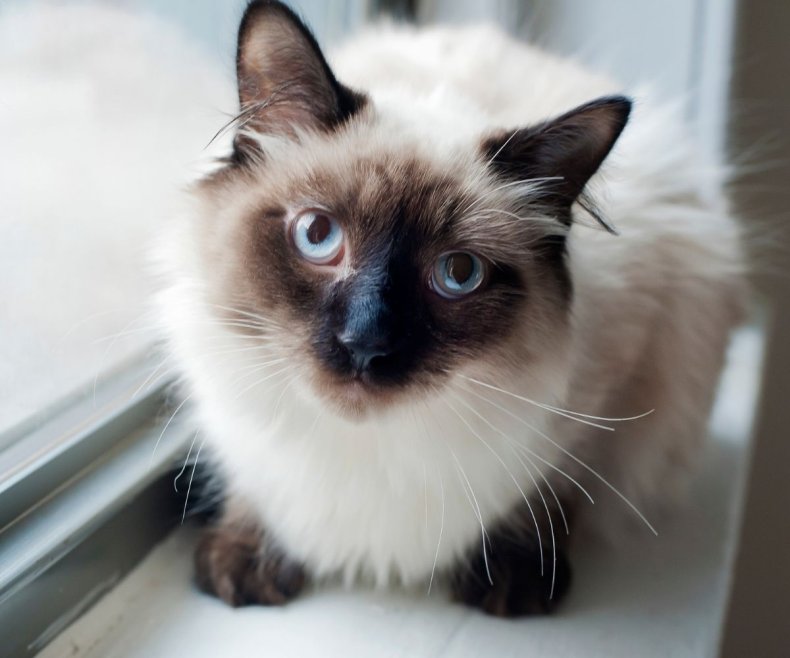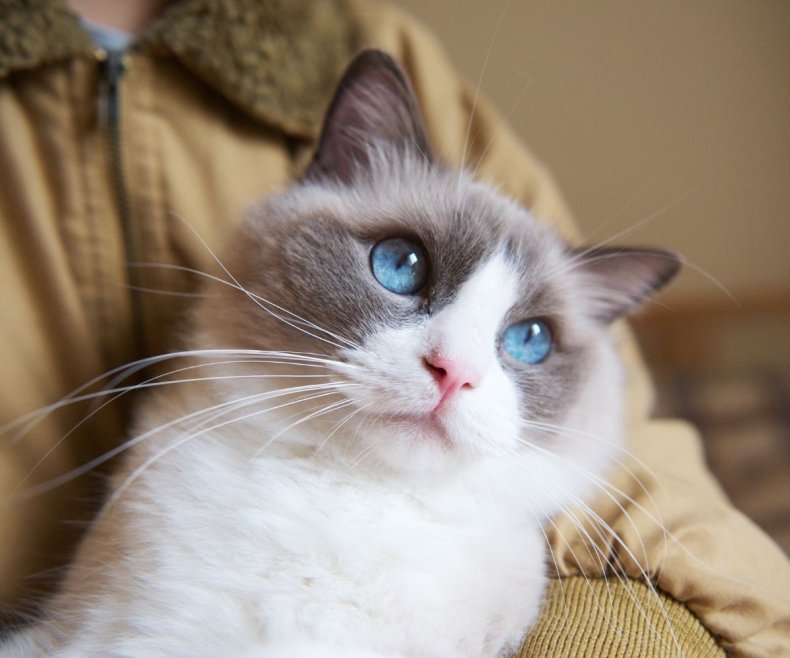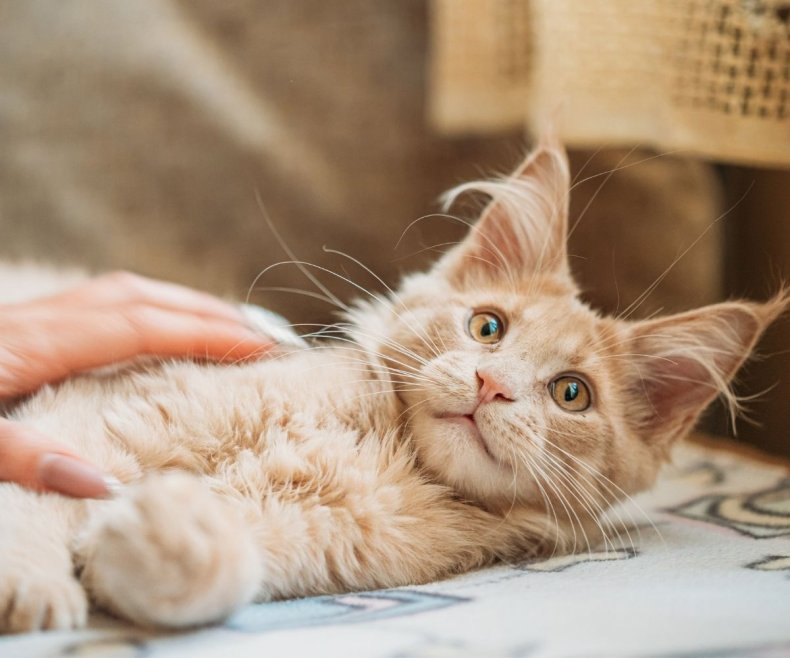Why These Friendly Cat Breeds Can't Get Enough Attention
When choosing a feline companion, the friendliest cat breeds are often the most desired. According to many scientists, years of domestication have caused cats to become more sociable and used to having humans in their lives.
In one 2014 report, scientists found 13 genes in domestic cats which had clearly adapted compared to their wildcat sisters, showing how they had become more friendly and domesticated.
However, knowing which cats are the friendliest can be difficult, and sometimes finding a more affectionate cat can mean your feline wants a little too much attention.
So, which cats class as friendly cat breeds and why are they this way?
Newsweek consulted the experts about the most affable kitties and what to do if yours has become too needy.
Are Some Cat Breeds Friendlier?
When speaking to experts on this issue, overwhelmingly veterinarians said how, when it comes to cats, it's far harder to settle on a few breeds which are "friendly". Some even said it is impossible to distinguish a friendlier breed from another.
This is due to how, unlike in dogs, most purebred cats are bred for their physical attributes, rather than their personality traits.
Dr. Jo Myers, Veterinary Expert on JustAnswer, told Newsweek: "Cat "breeds" are nowhere near equivalent to what we think about with regard to dog breeds... After all, it's even fair to go so far as to question whether or not cats are even truly domesticated."

Dr Myers explained how the majority of cats are not descended from or related to any type of purebred cats, which are naturally "furry little obligate carnivores and predators."
As a result, her view is there is not a specific type of cat which is friendlier than another.
Dr. Mikel Maria Delgado, cat behavior expert at Rover, agreed, telling Newsweek that the best way to know which breeds are friendliest is to meet them and access their individual personalities.
She said: "Some recent research has suggested that owners of purebreds do report some breed differences, but the studies often have had conflicting results and haven't always specifically looked at 'friendliness.' More research is needed to really connect cat breeds to personality."
"My recommendation is, if you are looking to adopt or buy a cat and 'friendliness' -- however you interpret that! -- is the top concern, meet the cat first and see if you gel with them and like their personality!"

Dr. Woodnutt told Newsweek: "All cats are individuals, and their personalities vary hugely from overly friendly to standoffish. In addition, how a cat is reared can make a big difference to their friendliness."
"Inevitably, a cat bred in a good environment, with a dedicated breeder who handles them regularly, will be far friendlier than a kitten born to a feral mother and trapped at a young age."
Friendly Cat Breeds
Despite this, according to Dr. Joanna Woodnutt, a veterinarian at Veterinary Content Company, and Dr. Emily Wilson of Fuzzy - The Pet Parent Company, there are specific breeds who generally seem to cope better with human interaction.
She cited Siamese, Ragdoll and Persian cats as some which are known to be friendlier around humans.
Dr. Wilson agreed with these breeds, also adding Maine Coon and Sphynx cats into the mix.
Siamese cats can be quite vocal, meowing and connecting with their humans that way, while Ragdoll cats are particularly relaxed.
Speaking to Newsweek, Dr. Wilson said: "Maine Coons are large cats with friendly sweet personalities that often thrive in households with children..."
"Sphynx cats have a unique hairless appearance and a sweet but comedic personality that makes them wonderful family cats. They often love to be the center of attention in the home and involved with day to day activities as well."
- Siamese
- Ragdoll
- Persian
- Maine Coon
- Sphynx
How To Deal with Attention-Seeking Cats
While having cats who are good with humans is a plus, sometimes the need for attention can be a lot for a pet owner. This is especially the case if there are young children or other animals in the house to look after.
Dr. Delgado suggested it is important to avoid rewarding bad behavior in cats with things like food and attention, and to ensure your cat knows they have not trained you into acting in a certain way.

She suggested routines are vital to stop cats from acting up, saying: "You can also help "needy" cats by making sure to keep up a solid routine of attention, meals, and care (such as cleaning the litter box daily). If you need help training your cat or working with misbehaviors, I recommend talking to a veterinary behaviorist or other behavior professional!"
Dr. Myers also said it can be a good idea to consult with a veterinarian if your cat is seeking a lot of attention, as this could be a sign of an underlying health condition which needs to be looked into. Examples such as hyperthyroidism, arthritis or dental disease can see cats pestering their humans in reaction to the pain.
She said: "As with many undesirable pet behaviors, it's always important to address any potential underlying medical problems that might be contributing to a sudden uptick in attention-seeking behaviors...
"A seemingly subtle medical condition like high blood pressure can also lead to more aggressive attention-seeking behavior. As a result, the first step is to have your cat thoroughly evaluated by a veterinarian."
Dr. Wilson, along with the other veterinarians, also suggested helping cats to continue using their natural cat behavior, through puzzles, scratching and other activities which will keep their neediness at bay.
This addition stimulation and enrichment can keep them busy, as well as helping them exercise and spend time outdoors.
She said: "For cats that crave an outdoor experience, catios can be a safe way for pet parents to allow them to experience going outside.
"Increased environmental enrichment can help cats while their owners and families are out of the home, but it's also important to integrate time into your daily routine to spend brushing, petting or playing with your cat. These activities will help strengthen the bond between cats and their pet parents."

